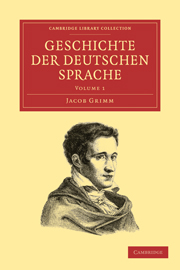Book contents
- Frontmatter
- AN GERVINUS
- VORREDE
- Contents
- I zeitalter und sprachen
- II hirten und ackerbauer
- III das vieh
- IV die falkenjagd
- V ackerbau
- VI feste und monate
- VII glaube recht sitte
- VIII einwanderung
- IX Thraker und Geten
- X Skythien
- XI urverwandschaft
- XII vocalismus
- XIII die spiration
- XIV die liquation
- XV die stummen
- XVI die lautabstufung
- XVII die lautverschiebung
- XVIII die Gothen
- XIX die Hochdeutschen
- XX die Franken
- Frontmatter
- AN GERVINUS
- VORREDE
- Contents
- I zeitalter und sprachen
- II hirten und ackerbauer
- III das vieh
- IV die falkenjagd
- V ackerbau
- VI feste und monate
- VII glaube recht sitte
- VIII einwanderung
- IX Thraker und Geten
- X Skythien
- XI urverwandschaft
- XII vocalismus
- XIII die spiration
- XIV die liquation
- XV die stummen
- XVI die lautabstufung
- XVII die lautverschiebung
- XVIII die Gothen
- XIX die Hochdeutschen
- XX die Franken
Summary
Den namen der liquiden verdienen L R M N, weil sie noch etwas von der natur des vocals an sich tragen und zwischen den stummen consonanten fliessen, daher auch häufig die stelle wechseln. R und L heissen im sanskrit halbvocale und werden den spiranten J und V an die seite gesetzt. auch in unsern europäischen sprachen geht L über in I und U, es wird gleichsam in den vocallaut geschmolzen; R aber entspringt in der mitte von vocalen. M entfaltet sich vor labialen, N vor gutturalen und lingualen wiederum aus vocalen. im sanskrit gehören hierher anusvâra und visarga, NG und H. einzelne sprachen, wie die chinesische, meiden den harten laut des R durchaus, umgekehrt die armenische und zendische das L.
Auch das ist ein zeichen der flüssigen natur des R, dass die spirans S zu R wird, der sausende laut zu einem summenden surrenden, wie die Engländer sagen, buzzing sound. unsre sprache scheint den allmälichen eintritt dieser wandlung gut zu zeigen. im gothischen hat sie noch gar nicht statt, bereitet sich aber dadurch vor, dass S inlautend bei zutretenden flexion en oder anhängen schwächung in Z erfährt, das nicht gleich dem ahd. Z, sondern als blöderes, dickeres schwirrendes S auszusprechen ist. Niemals kann der anlaut S gefährdet werden. Am seltensten erscheint dies Z nach A, ausser wo noch ein consonant vorhergeht: ans anza, þans þanzei, marzja, oder folgt: gazds, razda, Azdiggs, auch wenn langer vocal drückt: usana uzôn, azêts; nicht aber würde für basi kasa geschrieben werden bazi kaza.
- Type
- Chapter
- Information
- Geschichte der deutschen Sprache , pp. 309 - 341Publisher: Cambridge University PressPrint publication year: 2009First published in: 1848



